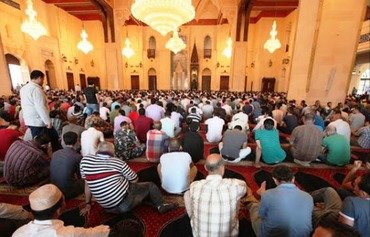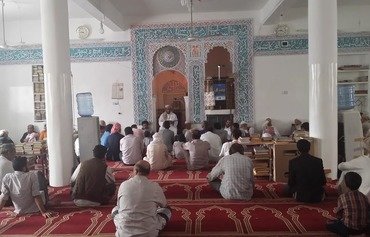In an attempt to spread the values of tolerance in mosques during the holy month of Ramadan, the Sanaa office of Yemen's Ministry of Endowments and Guidance is implementing an awareness programme about the dangers of extremism.
The effort, which is led by preachers and murshids (religious counsellors), focuses on providing guidance programmes and religious lectures and distributing promotional material such as magazines and leaflets to mosques across the Yemeni capital.
The programme includes more than 1,000 activities throughout the holy month, including mosque lectures, Ramadan evenings, Qur'an competitions, religious lessons, cultural seminars and organised protests against the ongoing war in Yemen, said Abdul Rahman al-Moshaki, deputy director general of the Sanaa Office of Endowments.
Conveying a sound religious message
Preachers and counsellors raise awareness about religious issues and people’s role in maintaining security and stability within society, he told Al-Shorfa.
They "correct certain misconceptions that stem from misplaced mobilisation efforts, such as the call for jihad that some groups use for their own agendas, irrespective of the clear and honest teachings of Islam", he said.
"Religious counsellors and preachers play an important role in conveying a sound religious and cultural message to society," he added.
The programme is being implemented in the 10 directorates of the capital, and includes appointing some of the counsellors to public councils in order to have a further reach within society, said Jameel Faraj, one of the counsellors participating in the programme who serves on the committee tasked with overseeing its implementation.
Of the many goals of the programme, he said the most important is "inspiring the target audience with the life of the Prophet Mohammed as a role model who treated Muslims and non-Muslims alike fairly, as well as inculcating the values of giving and generosity, particularly during Ramadan".
Other favourable values the programme aims to uphold include patience and fostering an atmosphere of compassion and reconciliation amongst people, he told Al-Shorfa.
Friday sermons have been unified in mosques, Faraj said, with preachers instructed to use their personal style, particularly when it comes to explaining the importance of social cohesion achieved through donations or zakat, which has to be given to the state.
Renouncing violence and extremism
The programme is running "smoothly according to schedule", said Mohammed al-Faqih, a preacher at al-Jaradi Mosque in Sanaa.
"During Ramadan, a lot of concepts in Islam are corrected, such as the importance of decent treatment among people and the importance of focusing on the noble values of Islam through one’s behaviour rather than merely performing the rituals such as prayer, fasting, zakat and others," he told Al-Shorfa.
During the holy month, people spend more time in mosques, a factor that should be exploited through the programme activities to disseminate the true values of Islam, he said.
Preachers and religious counsellors play a key role in "explaining certain concepts that could be confusing to many people as a result of the different schools and sects of Islam".
"This is particularly true when it comes to the culture of violence and extremism," he said, adding that "Ramadan should be a time for reflection and correcting one’s behaviour and reverting to the true values of Islam such as peace, compassion and reconciliation because it is a religion of life and not one of devastation and destruction".

![A Yemeni preacher delivers a sermon to worshippers at al-Rahbi mosque in Sanaa. [Faisal Darem/Al-Shorfa]](/cnmi_am/images/2016/06/30/5690-Sanaa-Rahbi-mosque-600_384.jpg)






